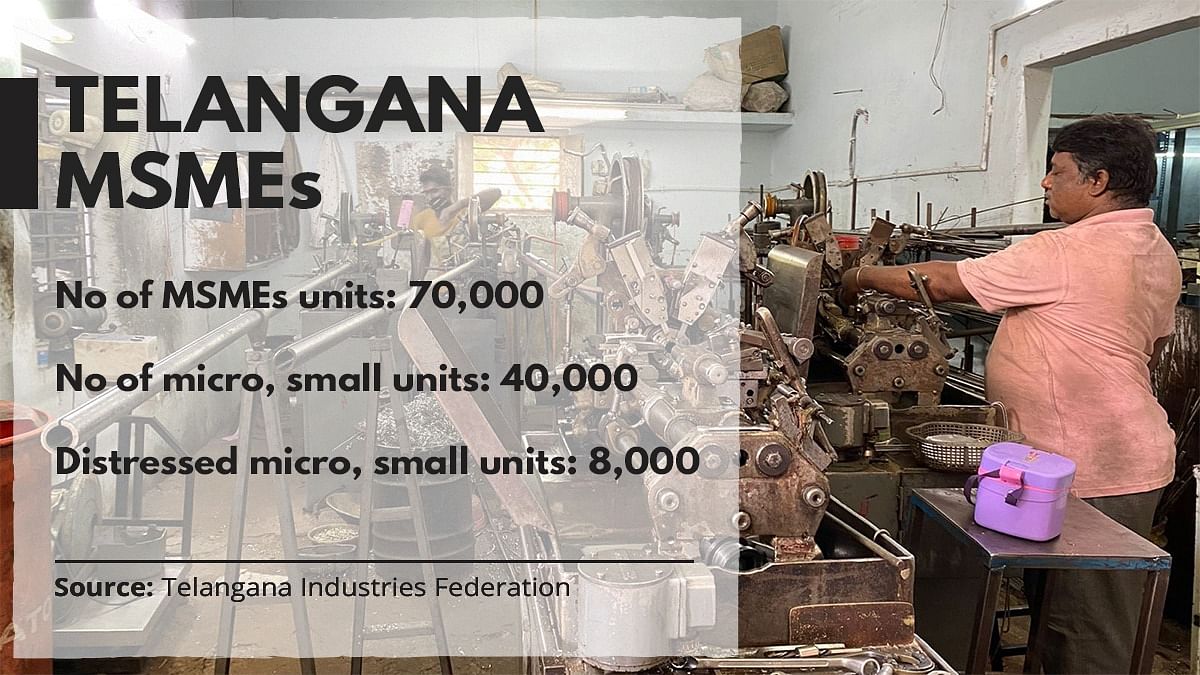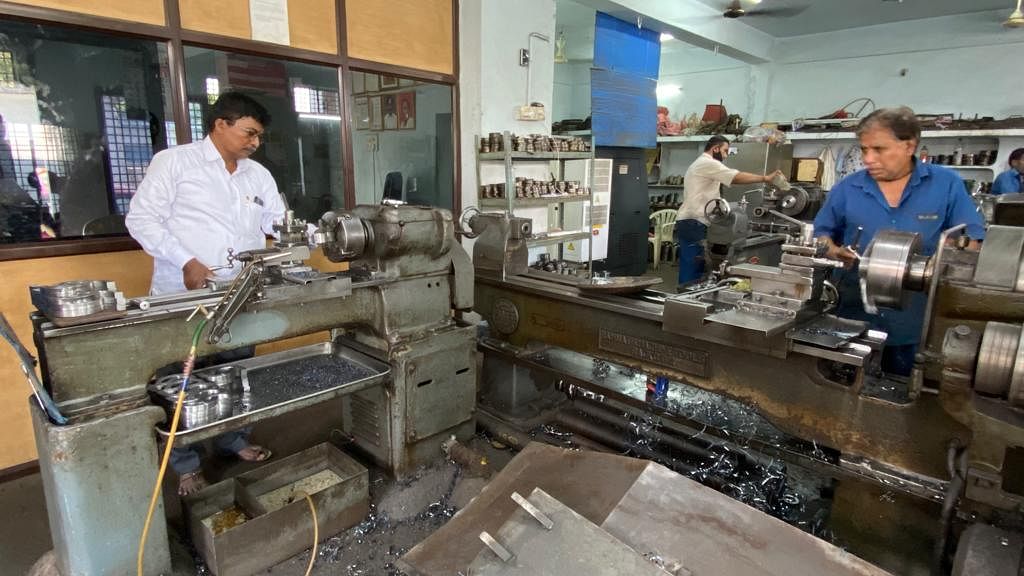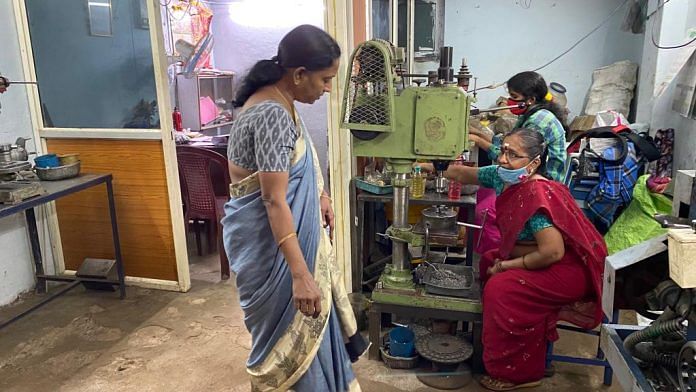Hyderabad: In a dingy corner of a two-room unit in a two-storeyed complex among the many narrow lanes of Hyderabad’s Kushaiguda neighbourhood, Jayalakshmi, 50, is taking stock of her tiny nuts and bolts manufacturing unit.
Ever since the Covid pandemic hit, her business — making small hardware manufacturing components for larger companies that are eventually supplied to the Railways — has struggled with a drop in demand and a rise in the cost of raw materials, slashing her production capacity.
Jayalakshmi told ThePrint she had to let go of over 50 per cent of her labour force, leaving her with just six employees.
She is now carefully planning her expenses, so as to be able to pay at least the monthly rent for her small space.
“Our expenditure is Rs 1.5 lakh per month and sometimes I don’t even make that much. So expenditure is more than my income,” she said. “During the lockdown, our units were totally shut down and at that time, I had to pay salaries from my pocket.
“The cost of raw materials increased by 35 per cent after everything opened up. The clients we cater to have still not paid us. My literal profit on every small nut we make here is 50 paisa. Imagine how many we have to manufacture and sell to run this unit,” added Jayalakshmi, who took over the unit in 2010 after her husband’s death.
Jayalakshmi’s facility and its troubles are a microcosm of the MSME economy at Kushaiguda, where businesses are run from one- or two-room tiny shed units, many of which are struggling to bounce back in the shadow of the pandemic.
Increasing raw material prices, plummeting demand, delayed payments from clients in the government as well as the private sectors, and high labour charges are posing several hurdles to these businesses.
Speaking to ThePrint, Telangana Industries Federation president K. Sudhir Reddy said there may be about 70,000 micro, small and medium industries (MSMEs) operating in the state, of which 40,000 are micro and small units.
“There is no exact count or official figure of how many units are working in Telangana but we estimate that there could be 40,000 micro, small units in the state and 20 per cent (about 8,000) of them are ‘incipient sick’,” Reddy said.
“No unit likes to call itself a ‘sick unit’ because if they do, even private lenders will not come forward to help them, forget banks. So, they put up a brave face. As it is, MSMEs were much stressed and Covid has pushed them to the edge.”

Gold loan and son’s savings
Umadevi, 45, who runs a buttons and bits unit in the area, said she had to take a gold loan “for the first time” to keep her business alive. She said at least 25 units she knows of have shut in the area, but there could be more.
“Not just loans from private lenders, I had to take a gold loan for the first time to keep my unit alive. I didn’t even have money to pay the rent of this room in which I am running the unit,” Umadevi told ThePrint.
“The first wave was horrible and so sudden that we were not prepared, and as if that was not enough, the second wave hit us badly. It did not allow us to bounce back. Steel is one of my raw materials, and its cost has shot up, impacting my production.”
Umadevi added that inflation as well as labour shortage has pushed up wage demand, further crippling small units like hers.
“Earlier they used to work for Rs 8,000 a month, but now even if I offer them Rs 15,000 they’re not ready to work,” she said, adding her employee base has shrunk to one worker from four in the pre-pandemic days.
The workers in the units of Kushaiguda are mostly migrants from states such as Bihar, Uttar Pradesh, Odisha and even Andhra Pradesh. Many returned to their home states during the first lockdown in 2020, creating an acute labour shortage.
Women entrepreneurs like Jayalakshmi found it even more difficult with not many labourers willing to work under a woman in the stereotypically male-dominated hardware industry.
“There are hurdles — most labour prefer to work under men, it is hard to convince them,” Jayalakshmi said. “Sometimes I wonder about the future of this unit, but I will try operating it for as many days as I can. This is my only source of income; I have a family dependent on me.”
Laxmi Kanthaiah, working president of the Micro Small Industrial Federation of Telangana, a private body, and who also runs his own unit in Kushaiguda, said micro or small units have no finance reserves to fall back on. Tough time for MSMEs began during demonetisation and since then it has been nothing but a struggle, he said.
Kanthaiah added that for the first time since he started his micro borewell parts manufacturing unit in 1980, he was unable to hand out bonuses to his workers.
During the lockdown, in 2020, he could pay just half the salary to his workers, that too from the pockets of his son and daughter-in-law who hold managerial jobs in the corporate sector.
“We cannot tell you how bad the situation is. If this continues, MSMEs can never recover,” he said.
“Most micro units are run by single digit employees, and unit owners spend from their own pockets; it is quite an unorganised sector. I know a hundred units that shut down during the pandemic. Frankly, I don’t know how we can resolve this issue.”

Loan troubles
A majority of the MSME owners have turned to borrowing from private lenders at a higher interest rate than from a bank. They say banks are not coming forward to give them loans and a unit has to cross many hurdles to get its loan application accepted.
Fifty-four-year-old Niranjan Reddy, who runs a micro unit in Kushaiguda manufacturing small steel components used for drilling in mining, said most of the 1,000-odd units in the industrial hub failed to get a bank loan.
“There is a lot of paperwork. A micro unit has daily wage workers and owners who are at the most educated until Class 10. They find it difficult to fill out all the paperwork,” he said.
“The banks I went to asked me if I had GST documents, I did. They asked me the size of my unit, they asked me if the place where I run my unit is my own property. It isn’t. Then they rejected my application. Tell me which micro unit owner has his own property to set up a unit and if that was the case, why would he go to the bank.”
When Finance Minister Nirmala Sitharaman announced the ‘Atma Nirbhar’ package for MSMEs in 2020, pitching it as a saviour to the units, one of the benefits was collateral-free loans of Rs 3 lakh. In fact, a 2019 RBI circular allows MSMEs to get collateral free loans of up to Rs 10 lakh.
Yerram Raju, founder of Telangana Industrial Health Clinic, a government body working for revival of MSMEs in the state, said banks are not ready to provide collateral free loans despite guidelines. He added that the revised definition of MSMEs, which pushed a lot of established mid-level industries into the micro and small sector, has impacted the smaller firms.
“Forget collateral-free loans, banks do not want to give even a regular loan to MSMEs because they believe this sector is really burdened and has no scope,” he said.
“Their interest towards corporate loans is so high and here it is exactly the opposite. A few micro units get loans under the MUDRA (Micro Units Development and Refinance Agency) scheme but that’s also very minimal. Further, mid-level industries coming under micro or small sectors have hurt the smaller ones. The mid-level industries have the labour, workers to do paper work; they can to an extent manage loans because their financials are also better than these smaller ones.”
Telangana IT and Industries Minister K.T. Rama Rao, also Chief Minister K. Chandrasekhar Rao’s son, had in June written to Sitharaman saying that the impact of the much-talked-about Rs 20 lakh Atma Nirbhar package has had little effect on the state.
Rama Rao said that over 80 per cent of MSMEs in the state faced a negative impact due to Covid and over 25 per cent of them suffered significant slump in revenues.
He asked the Union government to review the package and make it more realistic stating that a ‘one size fits all’ is not the solution to the unique issues, also adding how few schemes were complete ‘non-starters.’
(Edited by Arun Prashanth)
Also read: Why Telangana’s Huzurabad bypoll is key — it’s KCR’s might vs sacked minister now in BJP camp



